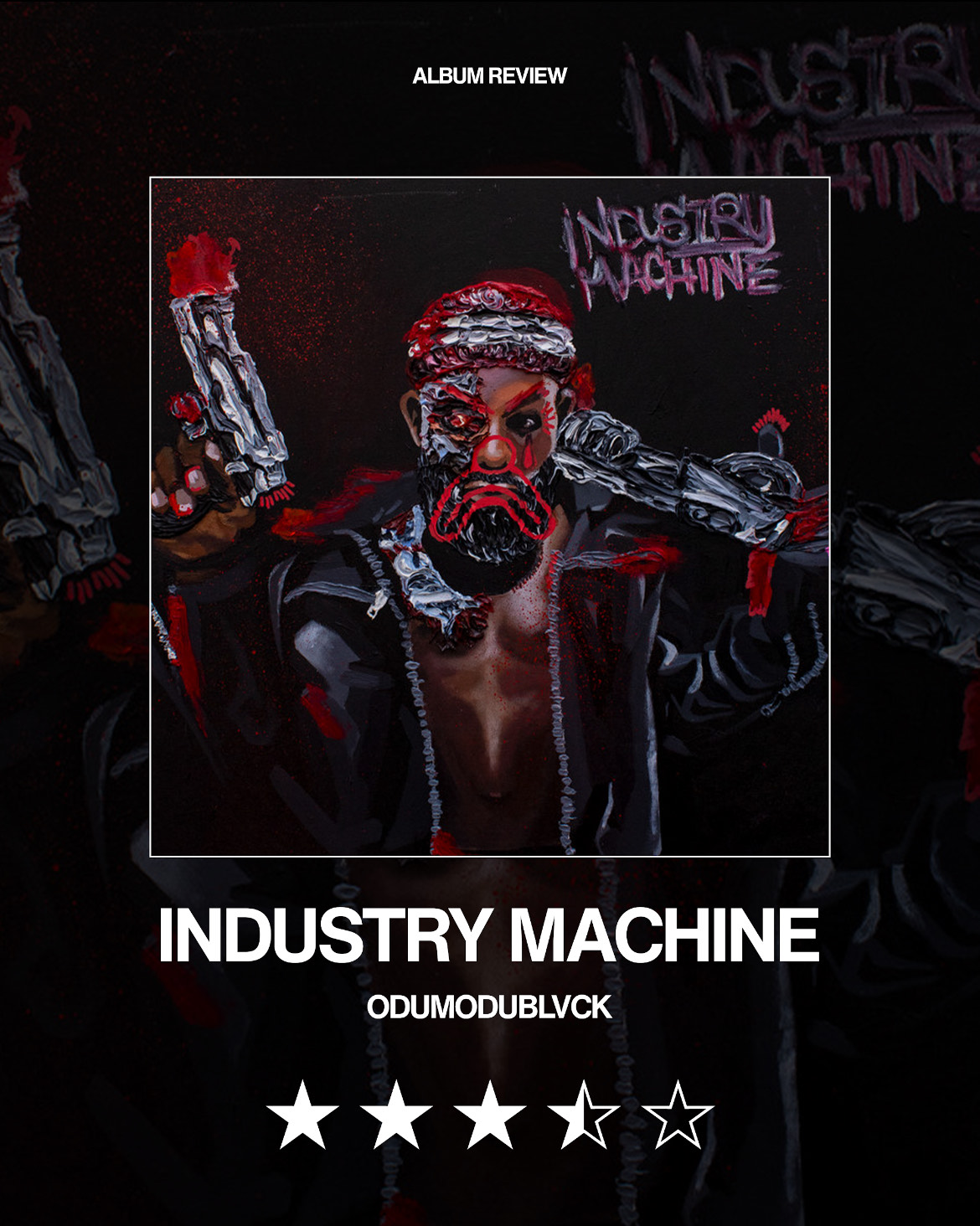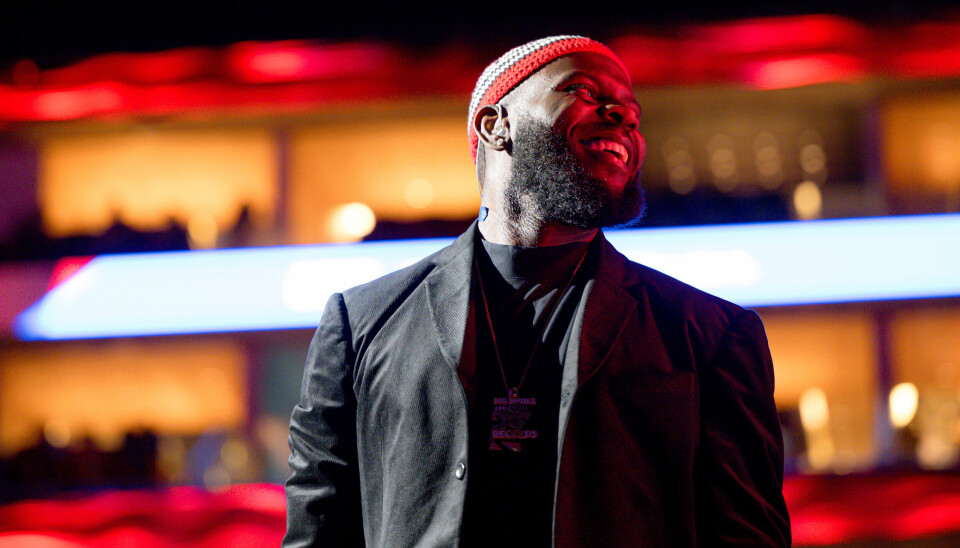
Odumodublvck’s sophomore album Industry Machine is at once an expansion of his seminal debut album Eziokwu and a radical departure from it. Like Eziokwu, Industry Machine finds Odumodublvck effortlessly toggling between frenetic and often blustery raps and saccharine-sweet melodies. Both projects are steeped in football references and allusions, if you follow him on social media, you will know that football holds a singular fascination for him. Declan Rice, a track on Eziokwu, named for the Arsenal midfielder, went on to become one of the most culturally significant songs of the era; Industry Machine hopes to continue in this tradition, spawning two records named for football stars: Maradona and Vinicius. Both projects also feature covers by artist-designer Olaolu “Slawn” Akeredolu-Ale.

A closer examination, however, reveals that with Industry Machine Odumodublvck has a different, more cavalier set of intentions: flattening aspersions regarding his artistry, bludgeoning his enemies, and cementing himself within the hallowed pantheon of Nigerian rappers, including acts like Mode 9, Olamide, M.I Abaga, Vector the Viper, Naeto C, and a host of others. If, with Eziokwu, he sought to establish himself as a formidable force within Nigeria’s Hip-Hop scene, proving himself capable of parlaying his cult following into mainstream success, with Industry Machine, he trains his focus on cementing himself within Hip-Hop legacy.
Though Odumodublvck had spent the latter half of 2022 and early parts of 2023 on a feverish run of singles, including Picanto, Dog Eat Dog II featuring Cruel Santino and Bella Shmurda, the Fireboy-assisted FIREGUN, and Declan Rice, very few people could anticipate the seismic shifts Eziokwu, released on the 6th of October 2023, would occasion.
Not only did the album go on to become the most commercially successful and one of the most critically acclaimed Nigerian Hip Hop albums of all time, but it also stirred an industry-wide reckoning. Until Eziokwu dropped, Hip Hop in Nigeria had increasingly ceded the spotlight to Afrobeats and other genres, so much so that the prevailing rhetoric held that Nigerians no longer enjoyed Hip Hop, the genre in which stalwarts like M.I. Abaga, Olamide, and Naeto C found immense success. Naturally, Eziokwu’s success forced critics and rappers to interrogate their suppositions and beliefs about the state of the genre, particularly the receptiveness of everyday Nigerians to Hip Hop.
In the aftermath of Eziokwu, two leading schools of thought have emerged. The first holds that Eziokwu provides a template for the contemporary Nigerian rapper looking to achieve mainstream success: marrying traditional Hip Hop with elements of Nigerian culture. This ethos buzzes through the work of the most compelling emerging rappers of today; among them Zaylevelten, Wave$tar, and Artsalghul. Those on the other end of the divide, the Hip Hop purists, if we may—have dismissed Odumodublvck’s distinct style of rap, which favours slang over intricate metaphors and double entendres, as a lesser form of rap. More hawkish critics have claimed his style of music doesn’t qualify as Rap.
The implications of this rhetoric are clear: it seeks to undermine his work and estrange him from the lineage of formidable rappers who have defined the genre at various turns. Industry Machine is largely an emphatic rebuttal to the claims. As such, the project glowers with indignation and finds him feverishly railing against his antagonists. In the titular opening track, Industry Machine, he wrestles against the narratives peddled by his antagonists. “Them say na rubbish we dey talk/ Them say na jargons we dey spit/ Some say na hullabaloo lingua/ But na my music them dey chop.”
In making his case as the latest torchbearer for Nigerian Hip Hop, on this album, he deploys three strategies—enlisting a flotilla of heavyweight artists, among them, Wizkid, Mode 9, Davido, Patoranking, Reminisce, Phyno, and Zlatan; bragging about his achievements and sounding warnings to his antagonists and would-be enemies.
The album is most alive when he’s actively tackling his enemies. When, in the intro of the Pa Salieu-assisted Unaware, he mumbles “Beef na wetin them say make I chop/ Beef na wetin them say make I wallop/ They can never win,” you feel that frisson, that jolt of excitement that invariably surfaces in the opening sequence of a war film. Later in the song when he song when he raps “Picture man begging/ Dem dey wonder how I dominate, ‘he is really doing numbers with his cornerstone rhythms,’” you feel his indignation with forceful clarity.
If You Like Gym—a diss track aimed at Blaqbonez, a rapper who, in the weeks leading to the release of Industry Machine, claimed Odumodublvck could not rap, crackles with a similar fervour. Layi Wasabi, which features legendary rapper Reminisce, is where this motif reaches its crescendo. “Take man for joke like say I no sabi/ You Layi Wasabi, joke man nothing wey you sabi,” he raps, again railing against his denigrators. From another person, that turn of phrase would perhaps have come across as pedestrian, but the vivacity with its distinctive lustre. The chemistry between Reminiscence and Odumodublvck is scintillating, across the song, as they take turns delivering machismo-sodden lyrics, you get the feeling of watching two virtuosos go at it.
Indeed, much of the pleasure of Industry Machine comes from hearing Odumodublvck bounce off energy with his collaborators. Maradona, in which, over a whimsical beat, he teams up with Justin Quiles, and Saweetie, almost feels like a night of karaoke with friends. We feel the same way when we listen to songs like Pay Me featuring Stormzy and Zlatan, and Adenuga featuring Skepta and Anti World Gangsters. His collaboration with Wizkid, Big Time, is also noteworthy. After Wizkid delivers an impassioned verse in which, with his voice thick with emotion, he pulls apart the grief of losing his mother, amongst other things, Odumodublvck offers a stirring consolation: “Baba calm down, rora, otito!”
With 23 songs that span over an hour, Industry Machine, at times, feels superfluous. But it’s an album that stays with you and makes you think of all the times when Hip Hop heavyweights have demanded an industry-wide reckoning. Kendrick Lamar’s beef with Drake easily comes to mind, but in the Nigerian music landscape, M.I. Abaga’s totemic single You Rappers Should Fix Up Your Lives, which prefigured his 2018 album A Study On Self Worth: Yxng Dxnzl, rings with more pertinence. I suspect the album will be here for a long time because it poses a universal question: what do you do when your flowers are being withheld from you? Odumodublvck offers a simple answer: take them for yourself!
